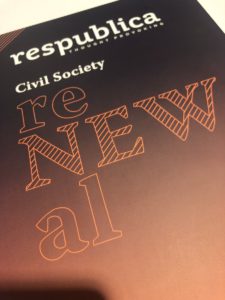 The political arguments made by some contemporary politicians use the language of democracy, but the underlying logic has more in common with populist authoritarianism – a strategy that could be called weaponizing the will of the people, writes The FT’s Gideon Rachman:
The political arguments made by some contemporary politicians use the language of democracy, but the underlying logic has more in common with populist authoritarianism – a strategy that could be called weaponizing the will of the people, writes The FT’s Gideon Rachman:
That strategy, it should now be clear, involves contempt for the rule of law, the trashing of national institutions, fostering an atmosphere of violence and deliberately widening bitter divisions within the country. Until recently, Britain and America could serve as genuine inspirations to liberals around the world, showcasing what a law-governed democratic system should look like.
The degeneration of liberal democracy in its Anglo-American heartlands will, sadly, have a global impact, he adds.
Research on populism elsewhere in Europe confirms that lying is a constant feature of populist politics. In France, Marine Le Pen lies about how her party spends public money and her (fake) Twitter accounts. Viktor Orbán, the Hungarian prime minister, lies gigantically and systematically about the migration to his country. As for Italy’s Matteo Salvini – from migration to sanctions against Russia – as the song goes, if his lips are moving, he’s lying, notes Catherine Fieschi, the author of Populocracy: The Tyranny of Authenticity and the Rise of Populism.
Are there diminishing returns to all this lying? Two factors are at play, she writes for The Guardian:
 One is whether there is a limit to the lies that voters will tolerate – and the jury is still out. Polls have not registered a decline in the support base for either Johnson or Salvini. Support for the far-right Austrian Freedom party (FPO) slipped by a third in the weekend’s general election as voters apparently punished leader Heinz-Christian Strache for a corruption scandal that brought down the coalition government. The result might plausibly suggest though that the FPO paid a price for behaving like old-fashioned politicians, rather than modern populists…. Limiting the advantage populists can gain from their bombast may ultimately have more to do with the skill of mainstream politicians and institutions. The EU’s new approach to the rules of migration management, for example, may help roll back Europe’s populist moment. Even if voters are not bothered by the lying, populist parties may simply find themselves outmanoeuvred.
One is whether there is a limit to the lies that voters will tolerate – and the jury is still out. Polls have not registered a decline in the support base for either Johnson or Salvini. Support for the far-right Austrian Freedom party (FPO) slipped by a third in the weekend’s general election as voters apparently punished leader Heinz-Christian Strache for a corruption scandal that brought down the coalition government. The result might plausibly suggest though that the FPO paid a price for behaving like old-fashioned politicians, rather than modern populists…. Limiting the advantage populists can gain from their bombast may ultimately have more to do with the skill of mainstream politicians and institutions. The EU’s new approach to the rules of migration management, for example, may help roll back Europe’s populist moment. Even if voters are not bothered by the lying, populist parties may simply find themselves outmanoeuvred.- A second issue is political culture. All populists have lying in their DNA, but they do not exist in cultural circumstances of their own making. In a culture where directness (or bluntness) and trust are highly valued, such as the Netherlands, breaking taboos around multiculturalism and political correctness is a perversely effective way to claim authenticity. Geert Wilders, with his talk of taxing hijabs and vitriolic statements about Islam, was a master of the outlandish statement twinned with a claim to authentic Dutchness.
 Can Europe reinvent its democracies? Parts of Europe have seen the consolidation of majoritarian democracy, with some countries turning towards authoritarianism. The space for opposition is shrinking amid clampdowns on media freedoms and the denigration of civil society, analyst Rosa Balfour writes for Balkan Insight:
Can Europe reinvent its democracies? Parts of Europe have seen the consolidation of majoritarian democracy, with some countries turning towards authoritarianism. The space for opposition is shrinking amid clampdowns on media freedoms and the denigration of civil society, analyst Rosa Balfour writes for Balkan Insight:
The work of non-governmental organisations — for example, in supporting refugees — has been hindered through legal and financial means as well as by new surveillance policies introduced in the name of fighting terrorism. Meanwhile, the increasingly concentrated power of populist and right-wing media — including outlets owned by politicians and their oligarch friends — has helped delegitimize civil society.







